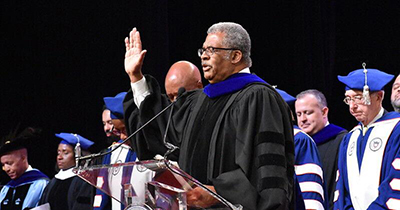
By Kathlyn Archibald-Drew / The Hilltop
(Source The St. Louis American):
Young Black adults are less religious and less engaged in Black churches than older generations, research shows.
The rate of college-aged students leaving the Black church is slower than the general public, however, the decline remains significant. As Pew Research Center notes 49% of Black millennials and 46% of Black Gen-Zers reported that they “rarely” or “never” attend religious services.
“When I came to Howard, I didn’t go to church for a semester, because it was nice having Sunday off without any pressure. [Eventually I thought] ‘if I want to be about the faith, I need to start going back,’” said Willie White, a sophomore honors political science major from Blackshear, Georgia.
Intergenerational attendance and membership are important to a church’s relevance and capacity, according to both scholars and members of the faith community. The Black Church’s youth exodus is unique due to social factors such as race and culture, which make African American faith communities distinct.
As noted in the Pew study, while older Black Christians are more likely to attend Black churches, only about half of Black Christian Gen-Zers reported attending a Black church.
“Once I found the university chapel it was definitely a home where I could see myself being,” White said reflecting on his experience.
66% of American young adults aged 18-22, who regularly attended Protestant churches during their teenage years, dropped out of regular attendance for at least a year during their college years, according to Lifeway research.
Khariss Bender, a sophomore media, journalism, and film major from Atlanta, mentioned that she did not attend church as frequently as prior to attending Howard.
“I think churches are definitely about community and I went to the same church from my infancy until I graduated high school,” Bender said.
“All of my closest friends and family are at my church back home, and it’s kind of hard to find that in D.C.,” she added, reflecting on her reasons for not attending church as often.
Generally, there is a spectrum of perspectives and students’ experiences vary, as Carter Semmons, a sophomore history major from Raleigh, North Carolina, mentioned. She started consistently attending church while at Howard, after not regularly attending during high school.
“When I started college I didn’t have the support system that I had back home, and I consider time-management important,” Semmons said.
Many college students experience multiple faiths for the first time in their lives as young adults.
“[College] opened my eyes to different things, because where I come from Christianity was pretty much the only accepted faith. If you had any other faith, you were pretty much alienated,” White said.
Students also discussed factors that they have found alienating about the Black church, with one significant issue being elders’ restrictive engagement with young people.
“Sometimes the ways [elders in church] interacted with young people made me feel distant. Some elders are not willing to connect with young people on our level and where we’re coming from,” White said.
Hypocrisy within the church was another alienating factor for 32% of young former church-goers.
Some students felt that divergent views on social issues contributed to their exit.
“The most alienated people in the church are LGBTQIA members, who grew up there but are told ‘you’re not going to heaven,’ ‘you’re against God’ and other things,” Bender said.
She also believes that the commitment to modern racial movements is lacking in the modern Black church.
“I feel the reason young people don’t go to church anymore is due to lack of activism. Compared to previous generations, where the Black Church was at the forefront of the Civil Rights Movement, Black churches are not as involved in the Black Lives Matter movement,” Bender said.
Reverend Rudy Daniels, a Masters Divinity graduate from Howard currently pursuing a PhD in Theology at Morgan State while preaching at their chapel, addressed some of the Youth’s criticism with compassion.
“There’s a politic that discriminates specifically against the youth in leadership,” he said.
He noted that roadblocks are frustrating, but offered hopeful solution, young people can redefine the Black church.
“Redefining is powerful because it’s no point to reinventing the wheel in terms of creating something that has existed for generations and I mean, it still works however, how we perceive it, and our limited scope has to be enlarged.”


Be the first to comment